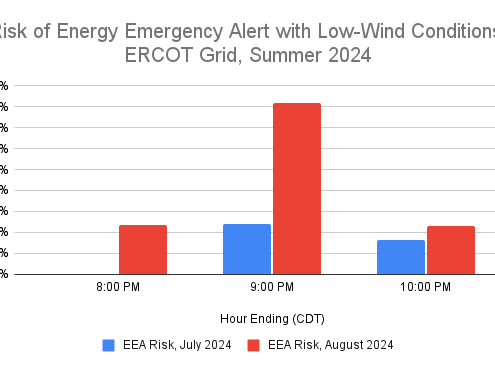Last Updated on July 9, 2024 by Mary Pressler
About TDU Delivery Charges
When you pay a power bill in Texas, there are actually two companies billing you for their service:
- Retail Electricity Provider (REP): The company selling you the energy.
- Transmission and Distribution Utility (TDU): The company in charge of the local grid, and they charge you for delivering energy to your home or business. TDUs are also known as Transmission and Distribution Service Providers (TDSP).
- The REP bills you the energy charge, while the TDU bills you the delivery charge, also known as passthrough charge.
The energy charge is determined by the electricity plan you choose, which means you have some control over the amount billed. On the other hand, the delivery charge depends on the TDU service territory where you are located. There are six TDUs in Texas, each with an assigned territory: Oncor Electric Delivery, AEP Texas Central, AEP Texas North, CenterPoint Energy, Texas-New Mexico Power (TNMP) and Lubbock Power & Light (LP&L).
The only way to change your TDU, is by moving to an address served by a different utility company. You can only choose your retail electric provider, and there may be multiple electricity plans available from the same REP.
Updated TDU Delivery Charges for All Service Territories
What is a delivery charge for electricity? TDU charges are composed of a fixed monthly charge and a variable charge per kilowatt-hour delivered.
- These charges are updated twice per year in March and September, with approval from the Public Utility Commission of Texas (PUCT).
- TDU charges may also be updated at other times of the year depending on market conditions, but these updates are not scheduled.
- Retail electric providers are not allowed to charge a markup when billing delivery charges.
- These rates must be applied exactly as approved by the PUCT.
Energy delivery charges are necessary to keep the grid in operation: components such as switchgear and transformers need regular maintenance, and grid capacity must be constantly increased to keep up with generation and consumption. The latest TDU charges were approved on March 1 2024, and the following table compares them with the previous rates.
As of January 2024, Lubbock Power & Light (LP&L) has completed the deregulation process and joined the competitive energy market. Several retail electric providers (REP) are now offering energy plans in the LP&L area.
TDU Delivery Charges Chart
| TDU | Current Delivery Charge (March 2024) |
Previous Delivery Charge (Until February 2024) |
Percentage Change |
| Oncor | $4.23 per month
4.5403 cents/kWh |
$4.23 per month
5.0979 cents/kWh |
10.9% Lower |
| CenterPoint Energy | $4.39 per month
4.0410 cents/kWh (Updated April 2024) |
$4.39 per month
3.8957 cents/kWh (Until March 2024) |
3.7% Higher |
| AEP Texas North | $4.79 per month
4.5254 cents/kWh |
$4.79 per month
5.3153 cents/kWh |
14.9% Lower |
| AEP Texas Central | $4.79 per month
4.8787 cents/kWh |
$4.79 per month
5.7114 cents/kWh |
14.6% Lower |
| TNMP | $7.85 per month
5.0383 cents/kWh |
$7.85 per month
6.0465 cents/kWh |
16.7% Lower |
| LP&L | Normal residential tariff:
$0.00 per month 6.442 cents/kWh Residential users with distributed generation: $30.00 per month 3.442 cents/kWh |
Normal residential tariff:
$0.00 per month 6.442 cents/kWh Residential users with distributed generation: $30.00 per month 3.442 cents/kWh |
No Change |
*LP&L published a document with their TDU rates in October 2023.
As you can see in the table above, most TDUs decreased their electricity delivery charges in March 2024:
- Your electricity provider has no control over TDU charges. Your retail provider bills them along with energy charges, and pays them to the local utility company.
- If you currently have a fixed-rate electricity plan, the energy charge is kept constant for the entire contract term, but the TDU charge is updated in March and September.
To compensate for rising TDU charges, you can switch to an electricity plan with lower energy charges. Energy efficiency measures and solar panels can also help you reduce your monthly electricity bills. Under the Inflation Reduction Act (IRA), both energy upgrades and solar panel systems qualify for a 30% federal tax credit.
How Are Power Bills Split Between Energy Providers and TDUs?
When you compare energy plans, the Electricity Facts Label (EFL) displays the average kWh price paid at three consumption levels: 500 kWh, 1000 kWh and 2000 kWh. These amounts include the TDU delivery charge, as you can see in the following example:
EFL: Payless Power 12 Month Prepaid (Oncor Service Territory)
The EFL shows the following kWh prices at the consumption levels mentioned above:
| Consumption Level | 500 kWh | 1,000 kWh | 2,000 kWh |
| Average kWh Price | 17.6 cents/kWh | 17.2 cents/kWh | 15.5 cents/kWh |
The EFL provides the following cost breakdown:
- Daily Charge: $1.00 per day
- Energy Charge: 9.20 cents/kWh
- Oncor TDU Delivery Charge: 4.5403 cents/kWh
- Oncor TDU Monthly Charge: $4.23
- Power Bill Credit: -$15.00 if you use 500 kWh or less
Consider that you may find different billing procedures in other EFLs.
The following table calculates the total power bill and average kWh price at the three consumption levels specified by the EFL, assuming a 30-day billing period:
| Consumption Level | 500 kWh | 1000 kWh | 2000 kWh |
| Fixed Daily Charges | $1.00 x 30 days = $30.00 | $1.00 x 30 days = $30.00 | $1.00 x 30 days = $30.00 |
| Energy Charges | 500 kWh x $0.092 = $46.00 | 1000 kWh x $0.092 = $92.00 | 2000 kWh x $0.092 = $184.00 |
| Fixed TDU Charge | $4.23/month | $4.23/month | $4.23/month |
| TDU Delivery Charges | 500 kWh x $0.045403 = $22.70 | 1000 kWh x $0.045403 = $45.40 | 2000 kWh x $0.045403 = $90.81 |
| Low Consumption Credit | -$15.00 | $0 | $0 |
| Total Charge | $87.93 | $171.63 | $309.04 |
| Avg. kWh Price | 17.6 cents/kWh | 17.2 cents/kWh | 15.5 cents/kWh |
If you want to know how the bill is split between the REP and TDU, you can add up their fixed and variable charges separately.
| Consumption Level | 500 kWh | 1000 kWh | 2000 kWh |
| REP Charges | $61.00 (69.4%) | $122.00 (71.1%) | $214.00 (69.2%) |
| TDU Charges | $26.93 (30.6%) | $49.63 (28.9%) | $95.04 (30.8%) |
| Total Bill | $87.93 | $171.63 | $309.04 |
Leave a Reply
Want to join the discussion?Feel free to contribute!











This charge is ludicrous!!
Is this new.
Yes it is !
no– always been around. It pays for the polls and wires, meters, etc.
The TDU charges are ridiculous,way to high
Isn’t it convenient for them to pick the month of September to increase the delivery charges just in time to collect from the hottest month of the year?!
The newly approved September rate has been applied retroactively to the August usage. Is in my opinion incorrect.
Looks like the overbilling should be refunded in the next bill.I.e the difference between $ 0.037435 and the new $ 0.054694 = $ 0.017259 per Kwh used.
In my case our usage was 1717 Kwh, so my refund should be $ 0.017259 x 1717 = $ 29.63 .
I’m seeing the same – new Sept rate applied retroactively to the Aug usage. How are you getting a refund? Contact the energy provider?
It’s applied to all meter reads on or after 9/1, its not applied to usage after 9/1 but to any *read* on or after 9/1. Yes, its unfair but applied per regulations. I would not expect a credit from the TDU. Someone whose meter read was on 8/31 was billed the lower rate.
Where did you hear you’re getting a refund?
The charges are outrageous! And these are updated or increased twice a year? If any one can provide information on where to protest or file a grievance please let me know
These TDU CHARGES ARE RIDICULOUSLY HIGH!!!
Remember this increase when you vote in 2024.
Come March, the rate will more than likely go down, as it has historically. This isn’t new, TDU’s change every March & September of every year.
Was I happy to see the increase? No. However, you get what you pay for, folks. The grid needs work, and that costs money.
If it helps, our rates are about half those of California, 50% less than NY, and comparable to Florida & Pennsylvania.
Makes you wonder what they spent all the money the TDU has collected on to justify a 46.5% increase. I really don’t care what California or New York pays – both are crooked states. When the transmission costs are almost as high as the consumption costs their is definitely something not right.
The grid has needed work since 2011. Where the hell has the money gone for the last 10 years? Oh right, ONCOR CEO makes 5 Million Dollars a year, that’s where It goes. No other state has to deal with a privatized grid. This is ridiculous.
Definitely remember this when you vote. Policy matters!
All we’ve been hearing all summer “use less energy, help us conserve” becuase their precious windmills and solar panels are useless when the wind doesn’t blow and the sun goes down. Now we get hit with higher distribution charges. It’s high time Oncor and friends stop virtue signalling and generate more real power. Does anyone think we would be short if we had invested in nuclear or natural gas generation for the past 20 years?
This is ridiculous! Nowhere in the above writing does it state that the charges would be applied retroactively. They can’t just arbitrarily retroactively apply rates and override what was there previously. I’m sure most people don’t realize yet because I just received my electronic bill and was floored. I’ve been on the phone for the last 2 hours between Centerpoint and my electricity provider and, of course, customer service has no clue.
I am simply trying to get confirmation from Centerpoint on how the TDU on my bill was calculated, if it is correct and if they can explain why the Aug rate was not used for Aug usage and why the Sep rate was used for both Aug and Sep usage. I’m waiting on a call back from a Centerpoint supervisor – let’s see if that happens.
Did you receive a response?
I’m having this same fight with them. Let us know if you make any headway. It seems very unfair that they can charge me September’s rate for my usage in August.
I just got service with this company and my 1st bill came to a suprise of tdu delivery charge I was not advise the rep says cost of pole and meter I lived more 30 years in my property and we install pole and meter they only connect power and they want me to pay for tdu charges for what if nobody in 30 years has come to my property check lines or pole they told me call aep they the once charging they just want to pass the bucket nobody know s who’s in charge of this charges it’s so ridiculous let me know who to contact for assistance
These TDU charges and all the nickel and diming little charges here and there, us to death needs to stop. My bill was $403, supposedly we used 2134kwh for the month of August. It’s just me and my husband there’s no way in hell we used that much energy. I’m at home during the day and literally do not turn any lights on because of all the windows. I don’t even use a light when going to the restroom, because of the huge window that allows tons of light in. Last August we had 5 people living in our house and we only used 1586kwh and the bill was $266.67. So I’d like to know whose meter they read. Because there’s no way we used that amount. Our TDU charges are $111.46 for August. It’s down right highway robbery. Oh forgot to mention that those bills are with a $100 credit for using over 1000kwh for the month. I spoke with my energy company and the customer service rep was nice but had no explanation other than to say it’s “inflation”.
I’m in the situation, my TDU was $250.90
4507kw energy was $361.82 / total 630.35 almost had a hart attack. Call my energy provider, could not give me an explanation other than the TDU when up. This needs to stop. Comments made that grid and other maintenance is needed is truth but I yet had seeing a one doing any maintenance in our area.
My Electrical bill was a $105.13. My delivery charges were $43.65 of that amount. Absolutely ridiculous that nearly half of my bill was delivery charges. TxNM is a total scam.
Usage for three weeks $96 and TDU charges $33….smh. If we pay the electric companies, why can’t the electric companies pay for prevention and maintenance? Or at least split the damn fees. U can’t catch a break w United Scam of America.
THESE TDU CHARGES ARE INSANE!!! MY BILL WAS 113.00 AND MY TDU CHARGE WAS 78.00!!! HOW IS THIS 32%?
My Delivery charges for January was $80. That is insane!!! Why are certain areas the only ones being billed these excessive charges? Why not have all Texans share in rebuilding. It seems this is targeting low/middle class communities. And then we lose power and are the last ones serviced!
Sooo… Encor only gets a 10% decrease. Drives me insane that 1) the absurd price 2) the WILD difference between the providers. Why? Oh wait, because nobody wants anything regulated. We all want our “freedom”, yet all this does is allow the rich to get richer and the Average Joe to suffer.